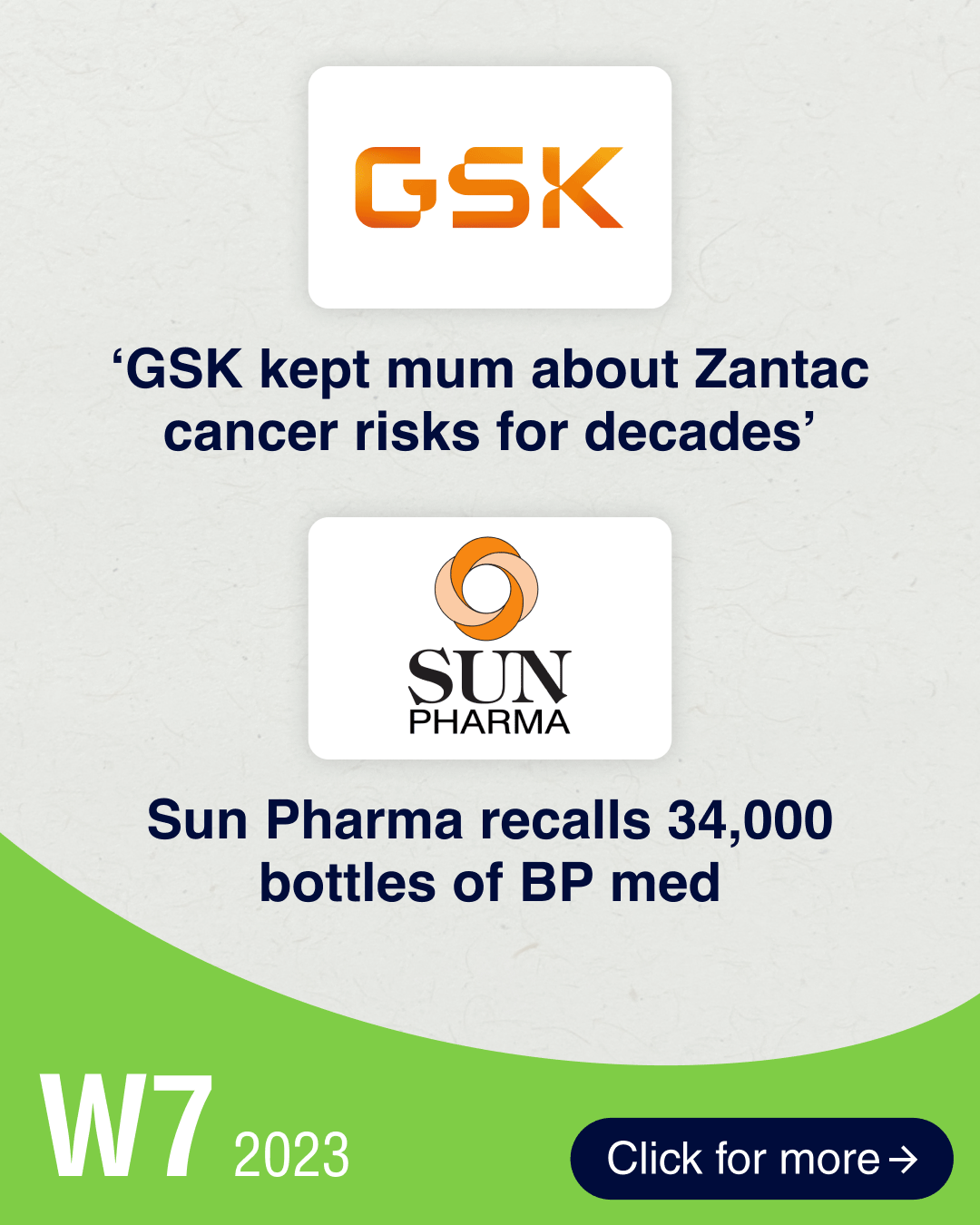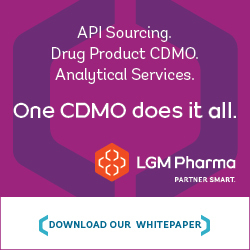
By PharmaCompass
2023-02-16
Impressions: 2,840 Article || 31 Video
A damning report brought out by Bloomberg has said GSK’s scientists knew for decades about the cancer risks associated with its popular heartburn drug Zantac but the drugmaker chose to keep quiet about them. There was good news on GSK’s Jemperli. A panel of external advisors to the US Food and Drug Administration (FDA) have backed its proposed single-arm trials to gain accelerated approval of Jemperli in a rare subtype of locally advanced rectal cancer. The agency also granted full approval to the drug as a treatment for endometrial cancer.
Sun Pharma has initiated a voluntary recall of over 34,000 bottles of generic drug diltiazem hydrochloride across the US. The drug, used to treat high blood pressure and angina, was manufactured at its troubled Halol (India) facility.
Spanish drugmaker Grifols is laying off around 2,300 employees in order to achieve annual savings of around US$ 427 million. In appointments, Brent Saunders is succeeding Joseph Papa and will join Bausch + Lomb as its chairman and CEO. Johnson & Johnson has appointed former global head of Sanofi’s R&D, John Reed, as the executive vice president of its pharmaceutical R&D.
In regulatory news, FDA has issued a complete response letter (CRL) to Biocon and Viatris’ biosimilar to Roche’s cancer therapy Avastin. The agency issued a Form 483 with two observations to generic drugmaker Laurus Labs’ formulations facility near Visakhapatnam (India).
AstraZeneca has predicted a low- to mid-single-digit percentage growth in 2023. And AbbVie said it expects sales of Humira to decline 37 percent in 2023.
GSK kept quiet about Zantac’s cancer risks for decades, says report
In 2020, FDA had pulled GSK’s popular heartburn drug Zantac (ranitidine) from the market after finding high levels of the carcinogen – N-nitrosodimethylamine (NDMA). Since then, GSK has argued there’s no “reliable evidence” the medicine causes cancer.
However, according to a report by Bloomberg, GSK chose to keep quiet about cancer risks associated with the drug despite being warned by its own scientists and independent researchers for 40 years. The report cites court filings, studies, FDA transcripts and new drug applications obtained through the Freedom of Information Act requests. The report claims GSK supported “flawed research” aimed at downplaying risks and chose not to make changes to its supply chain or storage procedures that could have lessened the impact.
GSK has refuted the allegations. “The company categorically refutes any allegation of having covered up data regarding the safety of ranitidine. The safety of ranitidine has been thoroughly evaluated over the past 40 years,” the drugmaker told FiercePharma.
GSK, as well as other makers of generic Zantac, including Sanofi, Pfizer and Boehringer Ingelheim, are facing over 70,000 lawsuits in the US for failing to warn consumers of the health risks. Last December, a US court dismissed thousands of federal lawsuits, saying they were not backed by sound science.
Jemperli bags FDA nod for endometrial cancer: There was good news on GSK’s cancer drug Jemperli (dostarlimab). FDA granted full approval to Jemperli as a treatment for endometrial cancer. Moreover, a panel of external advisors to the FDA backed the company’s proposed single-arm trials to gain accelerated approval of Jemperli in a rare subtype of locally advanced rectal cancer. The panel voted 8-5 in favor of GSK’s proposal.
Sun Pharma recalls 34,000 bottles of BP drug produced at troubled India facility
Sun Pharma’s troubled Halol facility in India is back in the news. The drugmaker has initiated a voluntary recall of five lots, or over 34,000 bottles, of generic drug diltiazem hydrochloride (360 mg dose) across the US. The drug, used to treat high blood pressure and angina, was manufactured at the Halol facility.
According to the FDA, the recall was prompted by the drug’s “failed impurity specification” during stability testing and failed dissolution testing at the FDA laboratory. Last December, the facility had received an import alert from the FDA. Last month, it was in the news again when the FDA issued it a warning letter for multiple violations of GMPs.
Meanwhile, Taiwan’s regulatory agency has recalled 10,000 doses of a batch of Sanofi’s antibiotic injection Targocid (400mg strength), used to treat infective endocarditis. Sanofi had informed the agency in October that the batch was contaminated with a water-soluble corticosteroid.
Grifols to axe 2,300 jobs; Brent Saunders returns to Bausch + Lomb as CEO
Spanish drugmaker Grifols is laying off 8.5 percent of its global workforce — or around 2,300 employees, in order to achieve annual savings of around US$ 427 million. The drugmaker said it will cut 2,000 jobs at its plasma business in the US to have a “more efficient” platform to obtain plasma and to lower costs.
The former CEO of Allergan, Brent Saunders, who headed Bausch + Lomb until 2013, is returning to the eye-care company as its chairman and CEO. He will take charge on March 6 from Joseph Papa, who is stepping down as CEO.
Just hours after Sanofi announced its global head of research and development, John Reed, is leaving the company, Johnson & Johnson said he will take over as the executive vice president of its pharmaceutical R&D. Reed will join on April 3, replacing the interim head William Hait.
FDA issues Form 483 to India’s Laurus Labs, CRL to Biocon’s Avastin biosimilar
Another Indian drugmaker received FDA’s Form 483 this week. Laurus Labs’ formulations manufacturing facility at Unit–2, APSEZ, near Visakhapatnam (India) was issued Form 483 with two observations. FDA had inspected the facility from February 6 to 10.
The agency has issued a complete response letter (CRL) to Biocon and Viatris’ biosimilar to Roche’s cancer therapy Avastin (bevacizumab). The CRL mentions the companies must satisfactorily address the issues identified during a facility inspection conducted last August. FDA had inspected Biocon’s seven manufacturing facilities across two sites in Bengaluru (India) and one at Johor (Malaysia) and issued Form 483s with multiple observations.
2022 results: Astra turns to oncology for growth; Humira sales to fall 37 percent in 2023
Last week, AstraZeneca reported US$ 44.35 billion in 2022 revenues, with cancer treatments accounting for 35 percent of its business. Like its peers, AstraZeneca also expects sales of its Covid products to fall in 2023. However, it is relying on its line-up of cancer, metabolic and rare disease drugs to sustain growth. For this year, the drugmaker has predicted low- to mid-single-digit percentage growth.
Meanwhile, AbbVie said it expects Humira sales to decline 37 percent in 2023 due to competition from biosimilars in the US. AbbVie hopes the sales of its other blockbuster drugs Skyrizi and Rinvoq – which generated over US$ 7.5 billion in 2022 sales – will help it offset the loss in revenues from Humira.
Baxter International’s 2022 worldwide sales increased by 18 percent to US$ 15.1 billion, though the company reported a net loss of US$ 2.4 billion. The company plans to cut up to 5 percent of its global workforce.
Teva Pharmaceutical reported US$ 14.9 billion in 2022 revenues, a 6 percent decline triggered largely due to lower revenues from drugs like Copaxone. And Biogen reported 2022 revenue of US$ 10.1 billion, down from US$ 11 billion in 2021 and US$ 13.4 billion in 2020.The PharmaCompass Newsletter – Sign Up, Stay Ahead
Feedback, help us to improve. Click here
Image Credit : Phisper Infographic by PharmaCompass license under CC BY 2.0
“ The article is based on the information available in public and which the author believes to be true. The author is not disseminating any information, which the author believes or knows, is confidential or in conflict with the privacy of any person. The views expressed or information supplied through this article is mere opinion and observation of the author. The author does not intend to defame, insult or, cause loss or damage to anyone, in any manner, through this article.”







